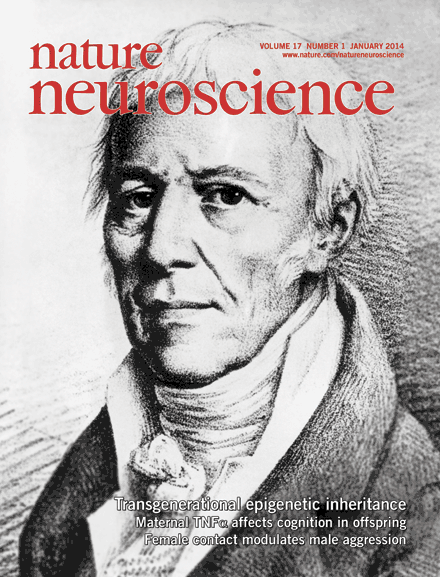
Posted by Erik Svensson
The latest issue of the journal Nature Neuroscience has the famous French evolutionary biologist Jean Baptist Lamarck on its cover. This is of course quite an unusal cover for a journal which is rather mechanistically oriented, and the reason is probably an article by Brian K. Dias and Kerry J. Ressler entitled "Parental olfactory experience influences behaviour and neural structure in subsequent generations." The claim made in this article, as well as implied by the choice of journal cover and in the "News & Views"-article by Moshe Shyf is that Lamarck's old but generally outdated theory of inheritance of aquired characters might be true after all, and the central dogma of molecular biology (that genes influence the phenotype but not vice versa) might be wrong.
Extraordinary claims requires extraordinary evidence, and I think it would be useful to critically discuss this paper at this semester's first lab-meeting, which will take place in "Argumentet" (2nd floor, Ecology Building) on January 14 at 10.30.
Undoubtedly, some rather pompous proponents of a so-called "Extended Evolutionary Synthesis" (EES) will probably welcome this study in their endless battle against the so disliked "Neodarwinian Synthesis", which I personally prefer to call "The Modern Synthesis" and so does population geneticist Jerry Coyne.
Undoubtedly, some rather pompous proponents of a so-called "Extended Evolutionary Synthesis" (EES) will probably welcome this study in their endless battle against the so disliked "Neodarwinian Synthesis", which I personally prefer to call "The Modern Synthesis" and so does population geneticist Jerry Coyne.
These endless, but often futile calls for "paradigm shifts" and "scientific revolutions" have been heard for many years, but have never been very succesful and appears to me to be more ideologically motivated than grounded in scientific advancements based on new theory or experimental results. A particularly enthusiastic proponent of the ESS, Massimo Piggliucci, has, however, seemed to have given up empirical evolutionary biology and moved on to philosophy instead, perhaps because the anticipated "revolution" did not happen the way he anticipated that it would?
In any case, Massimo probably enjoys philosophy more than biology (no empirical evidence needed that complicates things) and hopefully he has a lot to think about, given that he has three PhD-exams with him (in genetics, evolutionary biology and philosophy). As you can hear, I am sceptical.
You can hear that I largely agree with Jerry Coyne on the likelihood and validity of a forthcoming "scientific revolution", and I think those who call for this suffer from the so-called BIS - Big Idea Syndrome. Moreover, scientific revolutions do not happen because you want them. To quote Richard Lewontin, Jerry Coynes former PhD-advisor who states critically the following about scientific revolutions:
You can hear that I largely agree with Jerry Coyne on the likelihood and validity of a forthcoming "scientific revolution", and I think those who call for this suffer from the so-called BIS - Big Idea Syndrome. Moreover, scientific revolutions do not happen because you want them. To quote Richard Lewontin, Jerry Coynes former PhD-advisor who states critically the following about scientific revolutions:
Articles to discuss at lab-meeting (click on links):
Dias & Ressler
Szyf
